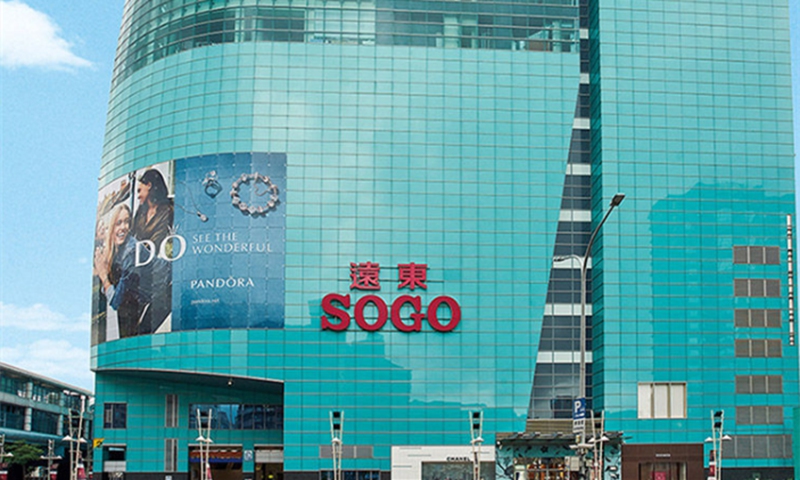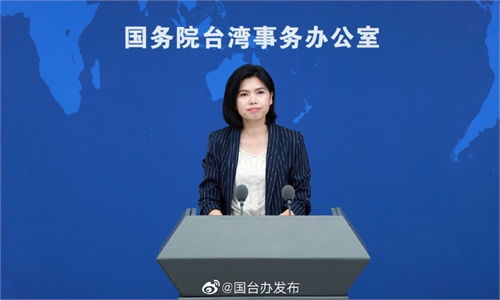
Shopping mall of Far Eastern Group Photo: screenshot of Far Eastern Group website
The Chinese mainland's warning to business founders and sponsors who support secessionist politicians in the island of Taiwan has achieved initial results, experts said, after Douglas Hsu, the CEO of Far Eastern Group (FEG) - the biggest donor to the Democratic Progressive Party (DPP) - published an article in a Taiwan-based newspaper stating that he supported "the 1992 Consensus" and "has always been opposed to the independence of Taiwan."
On Monday, Hsu published an article in the United Daily News and said that he hoped the cross-Straits situation could be maintained, and stated that he has "always opposed Taiwan's independence." He supported "the 1992 Consensus" and like the US and the international community, he supported the one-China principle.
Hsu's article came after Far Eastern New Century, whose holding company is FEG, received fines equaling about 36.5 million yuan ($5.7 million) in the Chinese mainland for violations of environmental protection regulations and other matters, media reports noted.
The fine for Far Eastern New Century came after Zhu Fenglian, a spokesperson of the Taiwan Affairs Office of the State Council, told a press conference on November 5 that the mainland would not allow the companies or paymasters of diehard secessionists to profit from the Chinese mainland, and will also take other measures to punish them.
FEG donated NT$58 million ($2.09 million) to the DPP in the 2020 regional legislative elections, making it the DPP's biggest donor, according to statistics posted online by authorities on the island.
The article in the United Daily News was Hsu's first public comment on his stance after receiving fines. Hsu wrote in the article that it was worrisome to see in recent years the phenomenon of "turning against everything about the mainland." There have been "zero political exchanges" across the Straits with frozen ties, but trade and economic exchanges are increasing.
"Under the current political circumstances in the island of Taiwan, some voices are trying to make companies that are doing business in the mainland feel guilty… there should be a rational understanding and judgment on the market of the mainland and we should not let ideology be superior above all," read Hsu's article.
Hsu's remarks showed that he finally realized the seriousness of the matter and started to declare his stance. The FEG's funding to the DPP has helped the latter further poison cross-Straits ties, which the mainland has now taken a zero-tolerance stance on, Wang Jianmin, a senior cross-Straits expert at Minnan Normal University in East China's Fujian Province, told the Global Times.
"But aside from Hsu's words, we also need to observe his actions and see whether he would play an active role in improving cross-Straits ties," Wang said.
Shaw Chong-hai, a columnist and former head of the school of social sciences at Chinese Culture University in Taiwan, said that Hsu made the remarks out of concern over businesses in the mainland. Hsu said he never supported the "independence of Taiwan" but still donated money to the secessionist DPP.
"Why didn't Hsu and FEG donate money to groups that promote cross-Straits ties and reunification?" said Shaw, noting that the FEG case is a warning to businesses founders and sponsors who secretly support secessionists in the island, and they should think twice before getting involved with secessionists.
Zhu, the spokesperson, told a press conference on November 22 that Taiwan secessionists, their affiliated enterprises and their investors must be punished, according to the law.
Wang noted that the punishment of FEG is the most severe one that related to the largest number of companies in more than 20 years. The mainland's warning has achieved some results as some diehard secessionists have acted utterly discomfited.
Su Tseng-chang, head of Taiwan's executive body, a key member of the secessionist DPP authority and die-hard secessionist who has been blacklisted and sanctioned by the mainland, and who reportedly is one of the main recipients of money from FEG, criticized the mainland for pressuring companies in the island and attempting to "ambush politics through businesses."
Wang said that demonizing the mainland is the clichéd tactic that diehard secessionists in the island, like Su, have always planned. But Su and the DPP secessionists have no morality at all, for they pressure companies to donate money to them while lashing out at them for doing business in the mainland, and at the same time destroying cross-Straits relations to create obstacles for these companies.
Analysts said that the mainland's crackdown on sponsors who invest in Taiwan secessionists will be long-lasting, rather than a new or temporary act, and the sanctions have nothing to do with most Taiwan companies in the mainland. They stressed that as long as Taiwan entrepreneurs do not support Taiwan secessionists, they do not need to be worried at all.


